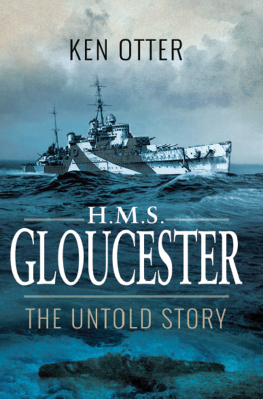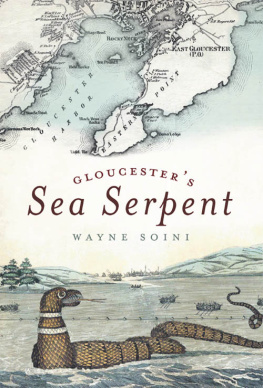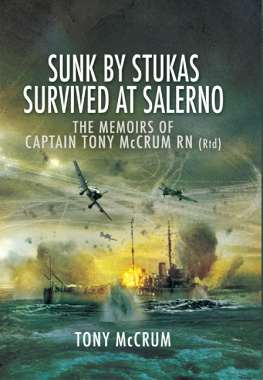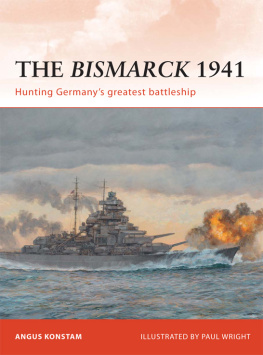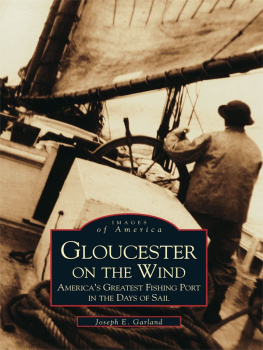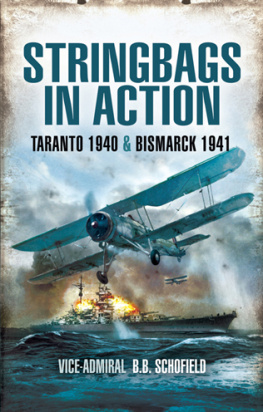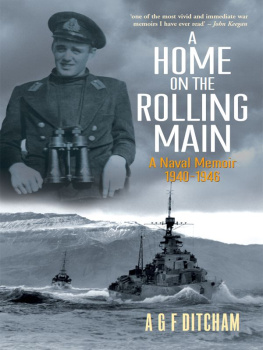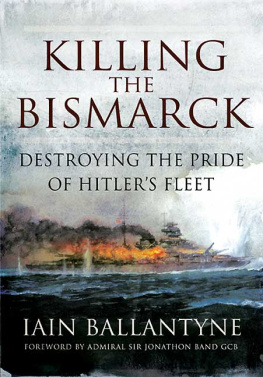
HMS Gloucester
The Untold Story
In honour of all who served on
HMS Gloucester 193941, and
to the memory of those who never came home.
HMS Gloucester
The Untold Story
Ken Otter
First published in 1999 by GAM Books, England
Second edition published in 2001
Published again in hardback format in 2004 by Pen and Sword Books
and again, in paperback format, in 2017 by
Pen and Sword Maritime
An imprint of
Pen & Sword Books Ltd
47 Church Street
Barnsley
South Yorkshire
S70 2AS
Copyright K.P. Otter 1999, 2001, 2004, 2017
ISBN 978 1 52670 211 1
eISBN 978 1 52671 402 2
Mobi ISBN 978 1 52671 401 5
The right of K.P.Otter to be identified as Author of this work has been asserted by him in accordance with the Copyright, Designs and Patents Act 1988.
A CIP catalogue record for this book is available from the British Library
All rights reserved. No part of this book may be reproduced or transmitted in any form or by any means, electronic or mechanical including photocopying, recording or by any information storage and retrieval system, without permission from the Publisher in writing.
Pen & Sword Books Ltd incorporates the Imprints of Pen & Sword Aviation, Pen & Sword Family History, Pen & Sword Maritime, Pen & Sword Military, Pen & Sword Discovery, Pen and Sword Fiction, Pen and Sword History, Wharncliffe Local History, Wharncliffe True Crime, Wharncliffe Transport, Pen & Sword Select, Pen & Sword Military Classics, Leo Cooper, The Praetorian Press, Seaforth Publishing and Frontline Publishing
For a complete list of Pen & Sword titles please contact
PEN & SWORD BOOKS LIMITED
47 Church Street, Barnsley, South Yorkshire, S70 2AS, England
E-mail:
Website: www.pen-and-sword.co.uk
Foreword
Introduction
I was seven months old when my father, Fred Otter, was killed during the battle of Crete. He had been in the Royal Navy since he was fifteen and eventually became the Chief Yeoman of Signals aboard the cruiser, HMS Gloucester .
I often used to wonder what sort of life he had led aboard ship and what circumstances had led to HMS Gloucester being sunk. Whenever I came across a book about the Second World War, I would flip through the index to see if the name Gloucester was mentioned. I was never able to find much detail and when I did come across information it was often limited to a few lines.
After school I spent two years in the Royal Navy and went on to join the Metropolitan Police Force in 1960. An absorbing career, marriage and three children, studying for promotion, and playing too much football, cricket and golf, left the mystery of my father's fate, and the story of his ship, on the back burner.
In my early forties, however, I made a more determined effort and managed to contact John Stevens, one of the few men who had survived the sinking in 1941. By a happy coincidence he was in the process of organising the first ever reunion of survivors and families of men who had served on HMS Gloucester . The group took on the ships nickname: The Fighting G.
I went to the first reunion, held in Plymouth, which is where HMS Gloucester was built. I didn't know what to expect but I soon met Roy Tremaine and Les Thomas, who had served under my father on board the ship. They were able to tell me things about my father that I had never known; that he had a wonderful sense of humour, his compassion for the welfare of men under his command and his distinct weakness for cream cakes! It was clear to me that they had thought him a wonderful man. I was not emotionally prepared for the things I was being told and found that I could hardly speak to them and the other survivors, let alone ask the many questions to which I had longed to know the answers. Forty-two years of pent up emotions had suddenly and unexpectedly come to the surface.
The following year I was able to return and be better prepared. I asked the survivors about their life at sea, what they remembered about the sinking of the ship and their traumatic experiences as prisoners of war. It soon became evident that the story of HMS Gloucester was both fascinating and devastating and should be written for future generations to read and understand the tragedy of war. Not one of the men I spoke to glorified war and their graphic testimonies are evidence that the appalling conditions under which they lived have left everlasting impressions on them.
Every year I returned to their reunion and every year there were fewer survivors than the previous year. It was obvious that the story of HMS Gloucester could soon be lost forever, however at that point I could find no time to fully research and write their story.
When I retired from the Metropolitan Police Force I went to Durham University to read history and the degree which I was awarded gave me the confidence to begin writing this book.
I set off, travelling around Britain, to interview men who had served on the ship and survived the sinking and searching out the families of men who had perished. The more interviews I conducted the more I was amazed at the story which was unfolding. The contrast of their lives on board ship before they became engaged in action in the Mediterranean could not have been greater than that which they experienced after the spring of 1940. These men, who by now were in their seventies and eighties, had lived through times which will never be experienced by future generations of sailors. There will never again be such a sustained war at sea as the men of the Royal Navy faced in the Second World War, particularly those who served in the Mediterranean.
I travelled to the Greek Island of Kythira, where the men were first taken when they were rescued. Here I discovered more details of the story and was fortunate enough to meet some wonderful Greek people who witnessed the sea battle in 1941 and one man in particular who risked his own young life to feed our sailors.
In this book I have, wherever possible, used the invaluable personal testimony of the people I interviewed. Many of those who served on the ship have now passed away, but some left written accounts of their service, and I was able to use these sources. This book is the story of the men who lived and died on HMS Gloucester. It is their story, not mine.
Many people have given me invaluable help, both in my research and in writing the book. The men and the families who I interviewed were most kind, inviting me into their homes and showering me with hospitality. To have the advice and encouragement of such an accomplished author as Wendy Robertson has been invaluable. Gill Richardson gave me the advantage of her constructive advice. The staff at Bishop Auckland Library, the Public Records Office at Kew, the Imperial War Museum and the National Maritime Museum at Greenwich, have all shown remarkable patience with me and their help was of considerable assistance. The Navy News proved an invaluable source in contacting men who had served in the Eastern Mediterranean Fleet. Efthia and Andy, who are The Greek Experience, made my visit to Kythira unforgettable. My friends Chip, Tanya and Chris Cats, from Colorado Springs, were extremely helpful in explaining the mysteries of computer technology and managed, most of the time, to keep straight faces whilst watching over me.
Next page
